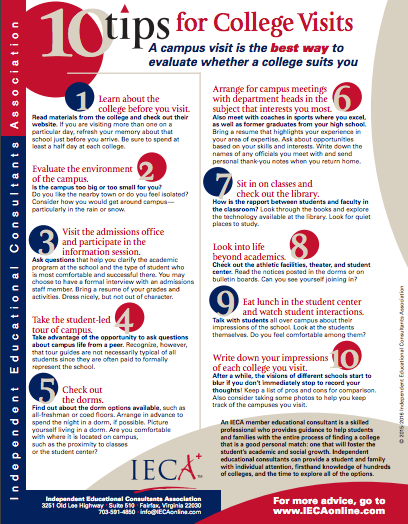The recent report from the Harvard Graduate School of Education entitled “Turning the Tide” suggests and recommends a lot of things. The report is in the news all of the time, so although I have no desire to read more about it, I do. Of all of the suggestions and recommendations, the one that I keep coming back to is recommendation #5: Expanding Students’ Thinking about “Good” Colleges
“Admissions officers and guidance counselors should challenge the misconception that there are only a handful of excellent colleges and that only a handful of colleges create networks that are vital to job success. It is incumbent upon parents to challenge this misconception as well. There is a broad range of excellent colleges across the country, and students who attend these colleges are commonly successful later in life in the full array of professions. There are many paths to professional success, and students and parents should be far more concerned with whether a college is a good fit for a student than how high status it is.”
The problem with this recommendation is that it ignores a) there are a ton of excellent colleges where meaningful networks can be created and b) there are many parents (and counselors) who have been for a long time encouraging students and families to look beyond the rankings, brand names and the haze of prestige.
I spend a good amount of time talking to parents and students who are “stuck” focused on a certain school or set of schools, many times unable to face the reality that attending one of these schools or school X of their dreams is slim. Most of the time, it has nothing to do with anything other than numbers, plain and simple, yet most students and families take this very personally because they have narrowly defined what a good (or even great) college is.
The saddest part of these conversations is knowing that either party is disappointed when they do not need to be, and that may of them wallow in this disappoints for the entire application process. There are so many GREAT colleges that fit the needs of so many students the choices are almost endless. I don’t know, but to me this is exciting. Having 3-5 solid options sounds like a dream to me, and this can be the reality for most students with proper planning and expectation setting (which includes having an expanded definition of what a ‘good” college is).
Having worked with college applicants for almost five years now, I know from experience how wonderful it is when a student receives a multitude of acceptances or acceptance to their top choice. This is not the result of luck, but of an appropriate college list. An appropriate list consists of a majority of match schools, and a few safeties and reaches—not a few safeties and then all reaches just for the heck of it. When you craft a list that sets your student up for success, nine times out of ten, the process ends on a positive note. The mindset of “just giving it a shot [regarding reaches]” is not a good one; it rarely if ever works out well.
There is very little if no luck at all in this process! Also, why would anyone want to attend a school where they are going be unsuccessful or be at the bottom of the class academically compared to their peers? Many people answer because they will build a better network, or because it is better to surround yourself with people that are smarter than you. To this I say you will find people smarter than you wherever you go, especially in college—take a peek at any honors program and you’ll see. Regarding network, sure, there may be some merit to this argument in some cases, but if you want entry into certain circles, there are ways to make that happen with hard work and a little persistence. A degree from college X is not always the only way to reach a desired career or network related outcome. Lastly, I’d rather attend a school that fits my academic profile and do my best to excel and rise to the top of the class than fall somewhere in the middle. If you have grad school in your sights, then this is key—you need a killer GPA, no exceptions, for a top graduate program.
When students and families expand their thinking about good (and I say, great) colleges, they open up a world of possibilities and from my experience, avenues for not only academic success but genuine happiness with their college experience. It is time to stop thinking so narrowly about college.

